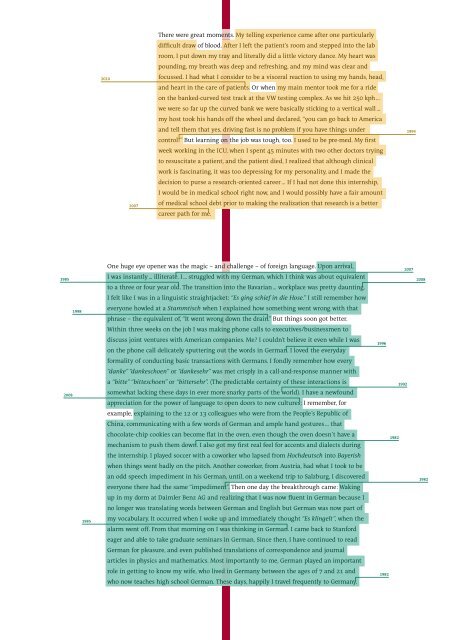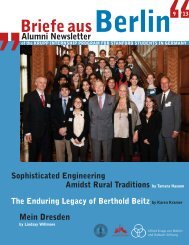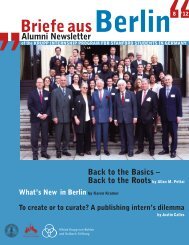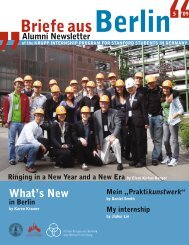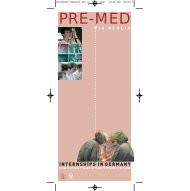The Krupp Intern: Letter to Berthold Beitz - Stanford University in Berlin
The Krupp Intern: Letter to Berthold Beitz - Stanford University in Berlin
The Krupp Intern: Letter to Berthold Beitz - Stanford University in Berlin
You also want an ePaper? Increase the reach of your titles
YUMPU automatically turns print PDFs into web optimized ePapers that Google loves.
1985<br />
2008<br />
1998<br />
1985<br />
2010<br />
2007<br />
<strong>The</strong>re were great moments. My tell<strong>in</strong>g experience came after one particularly<br />
diffi cult draw of blood. After I left the patient’s room and stepped <strong>in</strong><strong>to</strong> the lab<br />
room, I put down my tray and literally did a little vic<strong>to</strong>ry dance. My heart was<br />
pound<strong>in</strong>g, my breath was deep and refresh<strong>in</strong>g, and my m<strong>in</strong>d was clear and<br />
focussed. I had what I consider <strong>to</strong> be a visceral reaction <strong>to</strong> us<strong>in</strong>g my hands, head,<br />
and heart <strong>in</strong> the care of patients. Or when my ma<strong>in</strong> men<strong>to</strong>r <strong>to</strong>ok me for a ride<br />
on the banked-curved test track at the VW test<strong>in</strong>g complex. As we hit 250 kph …<br />
we were so far up the curved bank we were basically stick<strong>in</strong>g <strong>to</strong> a vertical wall …<br />
my host <strong>to</strong>ok his hands off the wheel and declared, “you can go back <strong>to</strong> America<br />
and tell them that yes, driv<strong>in</strong>g fast is no problem if you have th<strong>in</strong>gs under<br />
control!” But learn<strong>in</strong>g on the job was <strong>to</strong>ugh, <strong>to</strong>o. I used <strong>to</strong> be pre-med. My fi rst<br />
week work<strong>in</strong>g <strong>in</strong> the ICU, when I spent 45 m<strong>in</strong>utes with two other doc<strong>to</strong>rs try<strong>in</strong>g<br />
<strong>to</strong> resuscitate a patient, and the patient died, I realized that although cl<strong>in</strong>ical<br />
work is fasc<strong>in</strong>at<strong>in</strong>g, it was <strong>to</strong>o depress<strong>in</strong>g for my personality, and I made the<br />
decision <strong>to</strong> purse a research-oriented career … If I had not done this <strong>in</strong>ternship,<br />
I would be <strong>in</strong> medical school right now, and I would possibly have a fair amount<br />
of medical school debt prior <strong>to</strong> mak<strong>in</strong>g the realization that research is a better<br />
career path for me.<br />
One huge eye opener was the magic – and challenge – of foreign language. Upon arrival,<br />
I was <strong>in</strong>stantly ... illiterate. I ... struggled with my German, which I th<strong>in</strong>k was about equivalent<br />
<strong>to</strong> a three or four year old. <strong>The</strong> transition <strong>in</strong><strong>to</strong> the Bavarian ... workplace was pretty daunt<strong>in</strong>g.<br />
I felt like I was <strong>in</strong> a l<strong>in</strong>guistic straightjacket: “Es g<strong>in</strong>g schief <strong>in</strong> die Hose.” I still remember how<br />
everyone howled at a Stammtisch when I expla<strong>in</strong>ed how someth<strong>in</strong>g went wrong with that<br />
phrase – the equivalent of, “It went wrong down the dra<strong>in</strong>.” But th<strong>in</strong>gs soon got better.<br />
With<strong>in</strong> three weeks on the job I was mak<strong>in</strong>g phone calls <strong>to</strong> executives/bus<strong>in</strong>essmen <strong>to</strong><br />
discuss jo<strong>in</strong>t ventures with American companies. Me? I couldn’t believe it even while I was<br />
on the phone call delicately sputter<strong>in</strong>g out the words <strong>in</strong> German. I loved the everyday<br />
formality of conduct<strong>in</strong>g basic transactions with Germans. I fondly remember how every<br />
“danke” “dankeschoen” or “dankesehr” was met crisply <strong>in</strong> a call-and-response manner with<br />
a “bitte” “bitteschoen” or “bittersehr”. (<strong>The</strong> predictable certa<strong>in</strong>ty of these <strong>in</strong>teractions is<br />
somewhat lack<strong>in</strong>g these days <strong>in</strong> ever more snarky parts of the world). I have a newfound<br />
appreciation for the power of language <strong>to</strong> open doors <strong>to</strong> new cultures; I remember, for<br />
example, expla<strong>in</strong><strong>in</strong>g <strong>to</strong> the 12 or 13 colleagues who were from the People’s Republic of<br />
Ch<strong>in</strong>a, communicat<strong>in</strong>g with a few words of German and ample hand gestures … that<br />
chocolate-chip cookies can become fl at <strong>in</strong> the oven, even though the oven doesn’t have a<br />
mechanism <strong>to</strong> push them down. I also got my fi rst real feel for accents and dialects dur<strong>in</strong>g<br />
the <strong>in</strong>ternship. I played soccer with a coworker who lapsed from Hochdeutsch <strong>in</strong><strong>to</strong> Bayerish<br />
when th<strong>in</strong>gs went badly on the pitch. Another coworker, from Austria, had what I <strong>to</strong>ok <strong>to</strong> be<br />
an odd speech impediment <strong>in</strong> his German, until, on a weekend trip <strong>to</strong> Salzburg, I discovered<br />
everyone there had the same “impediment”. <strong>The</strong>n one day the breakthrough came: Wak<strong>in</strong>g<br />
up <strong>in</strong> my dorm at Daimler Benz AG and realiz<strong>in</strong>g that I was now fl uent <strong>in</strong> German because I<br />
no longer was translat<strong>in</strong>g words between German and English but German was now part of<br />
my vocabulary. It occurred when I woke up and immediately thought “Es kl<strong>in</strong>gelt”, when the<br />
alarm went off. From that morn<strong>in</strong>g on I was th<strong>in</strong>k<strong>in</strong>g <strong>in</strong> German. I came back <strong>to</strong> <strong>Stanford</strong><br />
eager and able <strong>to</strong> take graduate sem<strong>in</strong>ars <strong>in</strong> German. S<strong>in</strong>ce then, I have cont<strong>in</strong>ued <strong>to</strong> read<br />
German for pleasure, and even published translations of correspondence and journal<br />
articles <strong>in</strong> physics and mathematics. Most importantly <strong>to</strong> me, German played an important<br />
role <strong>in</strong> gett<strong>in</strong>g <strong>to</strong> know my wife, who lived <strong>in</strong> Germany between the ages of 7 and 21 and<br />
who now teaches high school German. <strong>The</strong>se days, happily I travel frequently <strong>to</strong> Germany.<br />
1996<br />
1982<br />
1982<br />
1992<br />
1994<br />
2007<br />
2008<br />
1982


